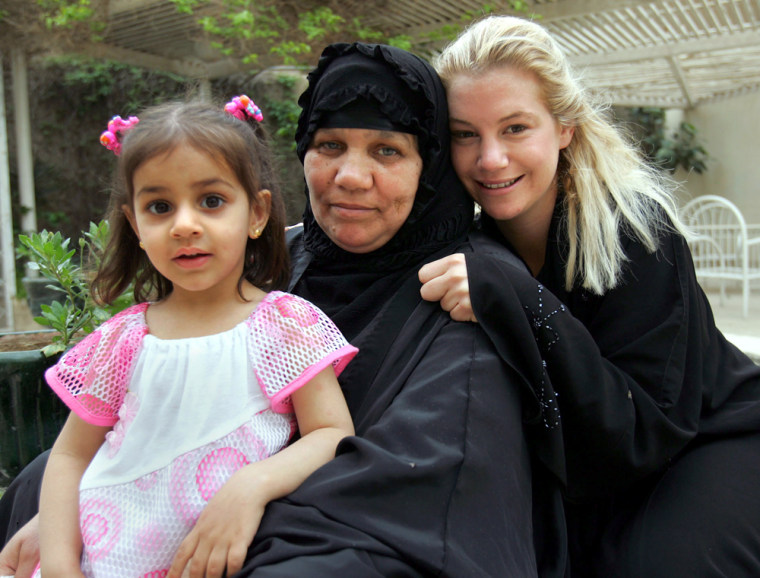A woman who led an effort to help those ravaged by violence in Iraq fell victim to the war herself when a car bomb killed her and two other people, officials said Sunday.
Marla Ruzicka, founder of Campaign for Innocent Victims in Conflict, died Saturday in the blast, which also killed an Iraqi and another foreigner, officials said. She had been in Iraq conducting door-to-door surveys trying to determine the number of civilian casualties in the country.
Ruzicka, 28, of Lakeport, founded CIVIC in 2003 and was instrumental in securing millions of dollars in aid money from the federal government for distribution in Iraq.
A force in Washington
U.S. Sen. Patrick Leahy, D-Vt., said it was Ruzicka’s idea to put a special fund in last year’s multibillion-dollar foreign aid bill to help Iraqis whose businesses had been bombed by mistake or as collateral damage.
“She was constantly calling us to say (lawmakers were) moving too slowly,” he said by telephone on Sunday. “Just from the force of her personality, we decided to take a chance on it.”
Ruzicka’s parents said they were notified of her death just hours after the explosion. U.S. Embassy officials publicly released Ruzicka’s name Sunday.
“We’ve been very worried about her but we know better than to tell our children not to do anything. We were supportive and just reminded her to be careful,” said her mother, Nancy Ruzicka.
‘Love and help’
She said her daughter had left her a telephone message the night before her death that said, “Mom and dad, I love you. I’m OK.”
“She cared about people and gave people her love and help,” Nancy Ruzicka said. “I’ll remember the love she spread around the world and the good ambassador that she was for her country.”
A skinny, ever-smiling woman with curly blond tresses, Ruzicka was untiring and undaunted as she went up against military and political bureaucracies in her effort to win help for Iraqi civilian victims of the war.
Leahy remembered Ruzicka as a fiery young woman who came into his office about two years seeking federal money to aid civilians.
Leahy said $10 million was added to the foreign aid bill last year for that purpose and another $10 million has been set aside for next year. The money was being distributed by government aid workers with Ruzicka’s help, he said.
‘Wanted to learn about the world’
Leahy said he would speak about Ruzicka on the Senate floor Monday, and possibly help plan a memorial service for the woman in Washington.
“I said to her father this morning, ‘A lot of people spend their whole lives and do not begin to accomplish what she’s done,”’ Leahy said.
The young American had begun campaigning for civilian victims in Afghanistan in 2002. That work helped produce precedent-setting legislation in Washington, sponsored by Leahy, authorizing aid to Afghans who suffered losses in U.S. military operations.
Ruzicka got her start working for non-governmental organizations 10 years ago at the San Francisco-based human rights group Global Exchange.
Medea Benjamin, the group’s director, said Ruzicka was a “pretty, peppy, vivacious young woman who wanted to learn about the world.” Ruzicka worked on projects ranging from AIDS in Africa to the travel embargo against Cuba, she said.
“It’s a terrible tragedy and a tragic irony that somebody who devoted her life to helping the victims of war would herself become a victim of war,” Benjamin said.
Determined to ‘spread the word’
When the U.S.-led invasion of Iraq began in March 2003, Ruzicka was already in Baghdad with Code Pink, said Jodi Evans, co-founder of the women’s anti-war group.
Other activists decided to return to the United States to talk about how the Iraqi people were affected by the invasion, but Ruzicka made a commitment to stay, Evans said. She founded the group CIVIC that year.
“Marla thought she would be more effective staying, because once the bombs started falling, people would be hurt and she needed to help them get their lives back together,” Evans said.
Even as fighting continued to rage in sections of Baghdad in mid-April 2003, Ruzicka arrived back in the Iraqi capital, set up office in an unprotected hotel and soon was a regular visitor to the city’s makeshift newsrooms, encouraging media interest in the civilian-casualty story.
“Spread the word — it will be what we make of it,” she e-mailed friends as she began her Iraq work.
Ruzicka is among several foreign aid workers killed in Iraq. Others included Margaret Hassan, a British aid worker who was abducted in Baghdad in October and later shown on video pleading for her life, and four workers for a Southern Baptist missionary group who were trying to find a way to provide clean water to people in the northern city of Mosul.
